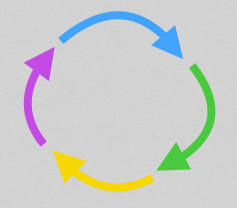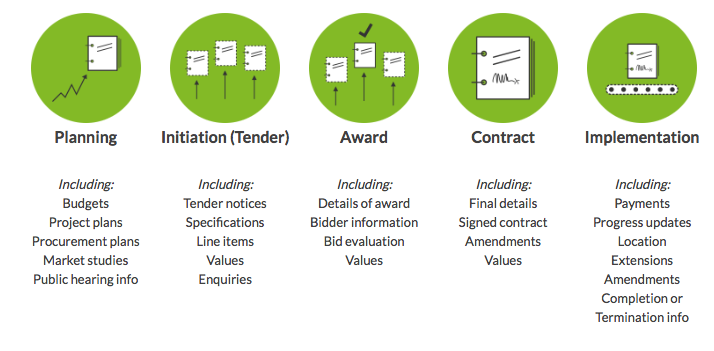From Publication to Award - The story of the missing information in the tender cycle

Billions of euros are spent on procuring for public goods. Our research shows that some of the procurement could be done more efficient and hence cheaper. Here, having information on the whole public procurement cycle is essential to evaluate the process and monitor it properly. Without information on contract implementation such as the final price paid and completion date, any assessment is incomplete hence can be misleading.
When most of the people think about public procurement they either think of the result (e.g. a highway or school being built) or the tender that they saw being announced. However, there is much more to it. Procurement processes sometimes span over long time periods and entail different stages. These stages usually include a call for expression of interest or pre-announcement; a formal call for tenders; announcements on modifications (if any); cancellations or clarifications of the calls (if any); announcements of the winning bidder(s) and details of the contract signature; and information on contract completion and assessment of companies’ performance during implementation. We exclude planning stages here, which are internal procedures and not published openly. While information on the full procurement process is crucial to assess its quality, publicly available information typically has considerable gaps in Europe.
 Open Contracting Data Standard provides a good overview of the full tender cycle (see above).
Open Contracting Data Standard provides a good overview of the full tender cycle (see above).
A major shortfall in covering the whole procurement cycle is the lack of information about contract implementation. This information is key in monitoring efficiency, and preventing corruption in procurement. Without this information, calculations for future risk assessment and benchmarking are impossible. Having this information does not only mean that citizens and civil society are able to monitor procurement processes - it is also crucial for public authorities and the evaluation of their procurement performance (I recommend reading this working paper to understand the relationship between benchmarking and procurement performance better). Nevertheless, only 8 in 33 European countries provide information on contract completion and the performance of the supplier (Read more about here). In some cases we found that while governments plan to provide the information on tender completion, the actual database lacks a lot of information. Like in the case of Italy.
In addition to quality management in contract performance, information on the contract implementation provides us also with information on the actual cost of the project. In a lot of cases costs in public procurement overrun. This can be due to unforeseen changes in the project (e.g. a construction side requires additional or different material than initially envisaged), but the reason can also be bad planning. A study by the Hertie School of Governance found that “the energy and ICT sectors especially are facing significant cost overruns, with 136% and 394% on average for finished projects respectively”. With such significant cost overruns the question about why the project was more expensive than foreseen becomes even more important.
While some European countries publish a wide range of documents related to the full tender cycle, announcements on contract implementation and completion are often very hard to link to procurement documents of earlier stages of the tender. Without linking all the different announcements characterising the same tender, it is very hard to assess spending efficiency or corruption risk. For example, knowing the final contract value at the end of contract implementation is a relevant bit of information, while it is much more valuable if it can be compared to the original cost estimate or the initially awarded contract value. In such cases of fragmented public information laborious case-by-case linking or inside knowledge about the tender are required to get the full picture.
To make public procurement more transparent and more efficient, we recommend governments to:
- publish all documents related to the tender cycle (this should include: call for expression of interest; formal call for tenders; announcements on modifications; cancellations or clarifications of the calls; announcements of the winning bidders; the details of the contract signature, information on contract completion and assessment of companies’ performance during implementation);
- link procurement documentation related to each tender, to make assessment of the tendering process easier and less prone to errors; and
- ensure the information is provided in a timely and complete manner.